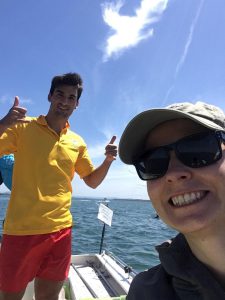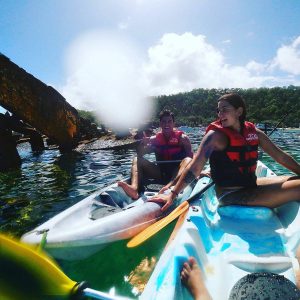October 3, 2019, by Postgraduate Placements Nottingham
Working out what my future might look like
Daniel Ramos Gonzalez shares his experience of a doing a BBSRC professional internship and what he did with a Graduate School IRCA award.
 Last year, thanks to the BBSRC PIP programme (a professional internship for PhD students) and the Graduate School’s International Research Collaboration Award (IRCA), I had the adventure of speaking about my PhD topic at the international triennial conference Mollusca 2018 in Wellington, New Zealand. As a student I’m still working out what my future might look like, so my PIP internship has been really important in helping me discover my preferences for my future scientific career and distinct insights in ecology and genetics.
Last year, thanks to the BBSRC PIP programme (a professional internship for PhD students) and the Graduate School’s International Research Collaboration Award (IRCA), I had the adventure of speaking about my PhD topic at the international triennial conference Mollusca 2018 in Wellington, New Zealand. As a student I’m still working out what my future might look like, so my PIP internship has been really important in helping me discover my preferences for my future scientific career and distinct insights in ecology and genetics.
Goal-setting is something that I’ve come to find really valuable and effective when thinking about personal development and so at the start of my internship I made sure to get clear on what I was hoping to achieve. These goals included experiencing a non-European academic environment, gaining insight in ecological science as a professional career, expanding my professional peer network, developing new skills and amplify my knowledge in the field of ecosystem restoration and maintenance, growing as an independent person, and improving my marine fieldwork abilities.
Presenting my research theme at the conference in New Zealand was a new challenge for me but I used guidance from courses I had received on scientific communication at the beginning of the DTP program at University of Nottingham. I also took advantage of the good advice and support of my two supervisors Dr. Sara Goodacre and Dr. Angus Davison, the latter being an expert in my field and in science communication. It could have been daunting to engage such a high qualified audience but thanks to my preparation and the support I received the talk was very successful and I was able to satisfactorily answer all the questions that were put to me.
“my PIP internship has been really important in helping me discover my preferences for my future scientific career”
During my internship experience I was been welcomed to the Dr. Carmel Mcdougall lab to work on a report about the Oysters species situation in a specific area that we called “Restore the Pumicestone Passage”. To accomplish this task we collaborated with an external consultant Dr. Diggles, an expert marine biologist in the zone. Historically, oyster reefs were an important source of farming and trading for the Aborigine people and also important for the colonial economy. However, human development and extensive farming have damaged and almost extinct those reefs in that area. Therefore, the objective of the project was to come up with a new plan to restore the reefs.
 Overall the study went very well and will hopefully offer a sound basis for further future studies in oyster reef restoration in that region. Furthermore, new unregistered species in Australian coast we identified may tell as of how little we know about real taxonomy and oyster diversity in Queensland coast. Further genetic and biodiversity work will be required to understand better how Queensland oyster reefs work. This new knowledge will bring better and accurate information of how we could restore oyster reefs in the zone.
Overall the study went very well and will hopefully offer a sound basis for further future studies in oyster reef restoration in that region. Furthermore, new unregistered species in Australian coast we identified may tell as of how little we know about real taxonomy and oyster diversity in Queensland coast. Further genetic and biodiversity work will be required to understand better how Queensland oyster reefs work. This new knowledge will bring better and accurate information of how we could restore oyster reefs in the zone.
Both the internship and conference was really useful to me. They made me mature as a person and as a scientist. I started a project from zero and produced good results in three months. The experience gave me an idea of what kind of science / research I may like to work in the future and I learnt new techniques and general knowledge in life science field that may be useful for my thesis or future career. Besides, all the procedures from the start were a unique opportunity to learn of how to apply for a grant / award, organise the trip, create a project, ask for permissions, produce a professional ecological report, generate new network and obviously grow as an independent person. I’m very grateful to the DTP program, my supervisors Dr. Angus Davison and Dr. Sara Goodacre, Dr. Carmel Mcdougall, Dr. Ben Diggles and the Graduate School for all their support.
If you’re a student interested in doing a postgraduate placement visit our webpage for more information, or check out current opportunities at the Placements Portal
No comments yet, fill out a comment to be the first

Leave a Reply